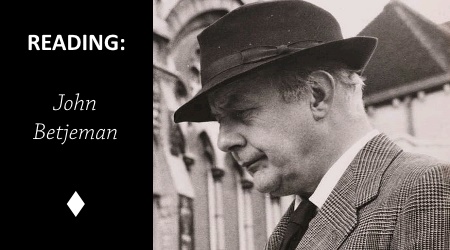Legendary poet laureate of the UK John Betjeman (1906-1984) was a nostalgic poet. According to Jocelyn Brooke, he is “a writer who uses the medium of light verse for a serious purpose: not merely as a vehicle for satire or social commentary, but as a means of expressing a peculiar and specialized form of aesthetic emotion, in which nostalgia and humour are about equally blended.” He was popular with the general reader, but also critically acclaimed by his fellow poets, including W.H. Auden.
Archibald
The bear who sits above my bed
A doleful bear he is to see;
From out his drooping pear-shaped head
His woollen eyes look into me.
He has no mouth, but seems to say:
‘They’ll burn you on the Judgement Day.’Those woollen eyes, the things they’ve seen;
Those flannel ears, the things they’ve heard—
Among horse-chestnut fans of green
The fluting on an April bird,
And quarrelling downstairs until
Doors slammed at Thirty One West Hill.The dreaded evening keyhole scratch
Announcing some return below,
The nursery landing’s lifted latch,
The punishment to undergo:
Still I could smooth those half-moon ears
And wet that forehead with my tears.Whatever rush to catch a train,
Whatever joy there was to share
Of sounding sea-board, rainbowed rain,
Or seaweed-scented Cornish air,
Sharing the laughs, you still were there,
You ugly, unrepentant bear.When nine, I hid you in a loft
And dared not let you share my bed;
My father would have thought me soft,
Or so, at least, my mother said.
She only then our secret knew,
And thus my guilty passion grew.The bear who sits above my bed
More agèd now is he to see:
His woollen eyes have thinner thread,
But still he seems to say to me,
In double-doom notes, like a knell:
‘You’re half a century nearer Hell.’Self-pity shrouds me in a mist,
And drowns me in my self-esteem.
The freckled faces I have kissed
Float by me in a guilty dream.
The only constant, sitting there,
Patient and hairless, is a bear.And if an analyst one day
Of school of Adler, Jung, or Freud
Should take this agèd bear away,
Then, oh my God, the dreadful void!
Its draughty darkness could but be
Eternity, Eternity.
The bear witnessed the life of the poet here. The “quarrelling downstairs” and the scratching keyhole. The punishment of the boy and the consolation he found in his teddy bear.
I have a brother who slept with a bear in his bed until he was old enough for a girl friend. Father didn’t think him weak or effeminate. There was no reason to hide, like in this poem, where the family home feels more like a boarding school.
The bear with worn thread prophesies death, inducing feelings of melancholy and misericordia in the poetic subject’s heart. “The freckled faces I have kissed / Float by me in a guilty dream.” are fine romantic lines.
The finale of the poem critizises psychoanalysis. It would take away the comforting bear, revealing the draughty darkness of Eternity (repeated). I read the dreadful void as a reference to the absurdity of life decribed in most varieties of existentialism, and the bear as that which makes the story of our life consistent. The slowly thinning brown thread running through our existence, as it were.
Betjeman is wonderful! Have a look at Betjeman’s Crematorium also.
